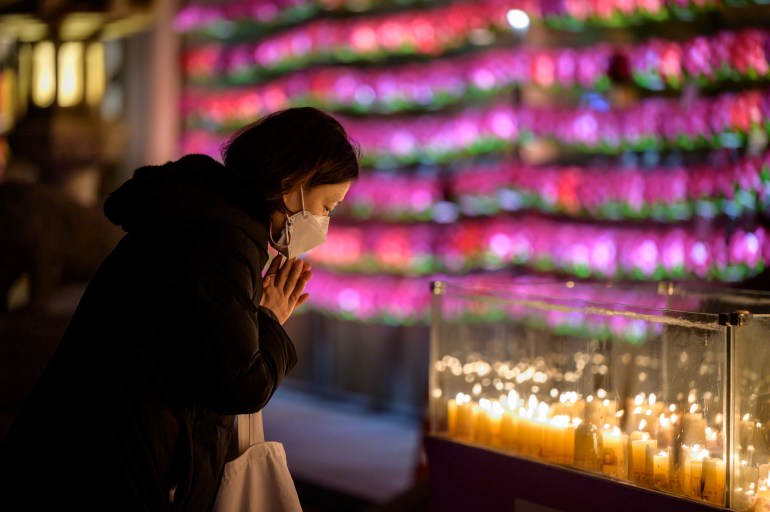Key test: South Koreans sit university exam amid COVID-19 surge
Nearly 500,000 high school students are sitting the test with stringent measures imposed to curb the virus.

South Korea fell quiet on Thursday as hundreds of thousands of students sat for the country’s high-stakes national university entrance exam amid a surge in coronavirus cases that has prompted new measures to curb its spread, including for candidates sitting the test.
Teenagers spend years preparing for the exam, which can mean a place in one of the elite colleges that are seen as key to future careers, incomes and even marriage prospects.
Keep reading
list of 4 itemsSpike in South Korea flu shot deaths fuels vaccine doubts
South Korean doctors to end strike over reforms as virus surges
South Korea church groups in conflict with COVID-19 efforts
This year, the coronavirus pandemic has added to the pressure – delaying and disrupting the school year and at times forcing all classes online.
At the elite Ewha Girls’ Foreign Language High School many students arrived on their own or with their test-taking friends and some parents seemed more nervous than their children. Tightened curbs following a wave of new cases meant students were banned from cheering on their classmates at the school gates as they arrived for the exam.
“I’m actually quite relieved now that it’s all going to be over soon,” said 18-year-old Kim Chae-eun.
“This exam is important because Korean society makes you study your whole life up till this point for this one exam.”


South Korea brought its outbreak under control earlier in the year with an effective system of “trace, test and treat”, but in recent weeks new cases have surged again.
On Thursday, the Korea Disease Control and Prevention Agency (KDCA) announced 540 new cases, bringing the country’s total caseload to 35,703, and the authorities have warned measures might need to be tightened further if cases are not brought under control this week.
The country operates a five-tier social-distancing system and greater Seoul – home to approximately half the country’s population – was put on Level 2 on November 24 as cases began to rise.
The exam itself is a particular concern, with nearly 500,000 pupils gathering in test centres across the country.
Students were checked on arrival and those showing temperatures of 37.5 Celsius (99.5 Fahrenheit) or higher – or other coronavirus symptoms – had to take the test in a separate, designated area.
Plastic see-through dividers were set up on each desk and students were required to wear masks throughout the test.
All candidates were advised to refrain from gathering and talking during breaks, with exam rooms to be ventilated after each session.
Quiet, please
The exam itself was delayed for two weeks due to the earlier disruptions to teaching, as all high schools across the country returned to online classes for a week to try and prevent school clusters.
“It will be even more difficult and worrisome to take the exam in the coronavirus situation,” President Moon Jae-in wrote in a good luck message posted on social media. “I’d like to put warm scarves around your necks.”
South Korea pulls out all the stops to ensure the test takers are not disturbed.

Government offices, businesses and even Seoul’s stock market opened an hour later than usual to reduce traffic and help the students arrive on time, and police escorts were available for any running late – no one is allowed into the examination room once the test has begun.
In addition, all flights at South Korean airports are suspended for 35 minutes during an English listening test, while all aircraft already in the air must maintain an altitude higher than three kilometres (9,843 feet).
The transport ministry said 89 flights were rescheduled due to the exam, including 10 international routes.
And there were no concessions for the infected: the government said 35 students who have the virus were due to take the test at the same time as their classmates, at hospitals or quarantine centres and supervised by education officials in full personal protective equipment.
A government demonstration video showed everything they used – from pencils to the name tag identifying their desk – would be disposed of as a biohazard afterwards.